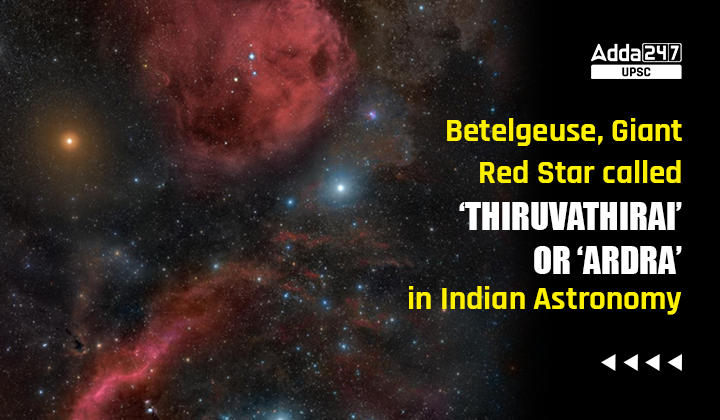Table of Contents
Betelgeuse Red Star: Betelgeuse is a red supergiant star located in the Orion constellation. It is one of the largest known stars and is nearing the end of its life cycle. Betelgeuse Red Star is also important for UPSC Prelims Exam and UPSC Mains Exam (GS Paper 3- Science and Technology).
Betelgeuse Red Star in News
Betelgeuse, the vivid red star known as ‘Thiruvathirai’ or ‘Ardra’ in Indian astronomy, is a prominent feature within the constellation Orion. Scientists from Japan and Switzerland have conducted research on this celestial body, focusing on its pulsation, which refers to the rhythmic expansion and contraction of the star. Their findings reveal that Betelgeuse is currently in its late carbon-burning stage. It is worth noting that in massive stars like Betelgeuse, the carbon-burning phase lasts for a relatively short period of a few hundred years. Following this stage, the star reaches the end of its life cycle and undergoes a dramatic supernova explosion within a matter of months.
Betelgeuse Red Star
In the vast expanse of the night sky, one celestial body captivates our attention with its fiery red brilliance – Betelgeuse. As a red supergiant star in the constellation of Orion, Betelgeuse has fascinated astronomers and stargazers alike for centuries. In this article, we delve into the captivating nature of Betelgeuse and explore its unique characteristics.
Betelgeuse’s Spectacular Features
Betelgeuse, also known as Alpha Orionis, is a remarkable star with distinct qualities that set it apart from others in the night sky. Here are some key features of this magnificent celestial object:
- Size and Luminosity: Betelgeuse is an immense star, approximately 700 times larger than our Sun. Its radius stretches over 1,000 times that of the Sun, making it one of the largest known stars in the Milky Way galaxy. This vast size contributes to its exceptional luminosity, with Betelgeuse shining as one of the brightest stars visible from Earth.
- Red Supergiant: The striking red color of Betelgeuse signifies its classification as a red supergiant. This hue stems from the star’s relatively low surface temperature, which is cooler than that of smaller, hotter stars. Betelgeuse’s redness is a result of its surface emitting predominantly red light.
- Variable Star: Betelgeuse exhibits variability in its brightness, making it a variable star. These fluctuations occur over a period of time and are caused by the star’s complex internal processes. At times, Betelgeuse can dim or brighten, adding to its allure for astronomers studying its behavior.
- Proximity and Distance: Despite its tremendous size, Betelgeuse is relatively close to our solar system, located approximately 640 light-years away. This proximity allows us to observe it in detail and study its evolution.
Betelgeuse’s Cosmic Journey
Betelgeuse has undergone a remarkable journey throughout its existence, evolving from a massive, hot star to its current stage as a red supergiant. As a star exhausts its nuclear fuel, it expands and undergoes various stages of fusion, ultimately leading to a supernova explosion.
Future of Betelgeuse
Speculation and curiosity surround the fate of Betelgeuse. Astronomers anticipate that it will eventually explode as a supernova, releasing an incredible amount of energy. When this cosmic event occurs, Betelgeuse will briefly outshine all the other stars in the galaxy, creating a dazzling spectacle visible from Earth.
Cultural Significance of Betelgeuse
Betelgeuse holds cultural significance in different societies. In Greek mythology, it represents the shoulder of the mythical hunter Orion. The star’s Arabic name, “Betelgeuse,” translates to “The Great One.” Its celestial prominence has inspired countless stories and legends, bridging the gap between science and human imagination.
Conclusion
Betelgeuse, the radiant red star of Orion, continues to awe and inspire us with its grandeur. As one of the brightest and largest stars in the night sky, it serves as a reminder of the vastness and beauty of our universe. While we await the eventual supernova explosion, Betelgeuse continues to grace our celestial stage, inviting us to gaze up in wonder and contemplate the mysteries of the cosmos.
Solar System Definition, Planets, Order, Sun, Moon, Stars
| Follow US |
| UPSC Govt Jobs UPSC Current Affairs UPSC Judiciary PCS Download Adda 247 App here to get the latest updates |



 TSPSC Group 1 Question Paper 2024, Downl...
TSPSC Group 1 Question Paper 2024, Downl...
 TSPSC Group 1 Answer key 2024 Out, Downl...
TSPSC Group 1 Answer key 2024 Out, Downl...
 UPSC Prelims 2024 Question Paper, Downlo...
UPSC Prelims 2024 Question Paper, Downlo...




